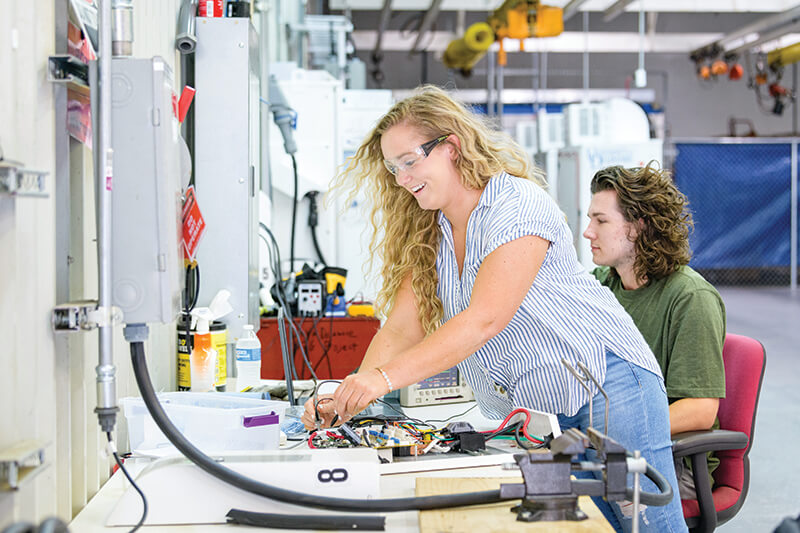
MAJOR FINDER
Filter by College
Filter by Subject
Electrical Engineering

Endless Career Opportunities
Entrepreneurship is the driving force for innovation and growth in the global economy, and UD’s educational and research programs in electrical engineering provide numerous opportunities to explore this force underlying the competitiveness, success, and prosperity of society.
Undergraduate laboratory experiences give students the chance to practice skills they learn in classes on real devices and to see firsthand the physics that they describe mathematically in classes. Because of our lab courses, upon graduation our students not only understand the technical world but also have the skills and experience to change it. Our electrical engineering students, faculty, and alumni have helped launch a multitude of entrepreneurial success stories over the years. They continue to change the world with their spirit of innovation, passion for technology, and technology transfer.
Electrical engineering students at UD benefit from a broad array of experiential learning opportunities, including robust senior design and undergraduate research programs, as well as our Vertically Integrated Projects program, which unites undergraduate education and faculty research in a team-based context. Many of our undergraduates publish papers in scholarly journals or attend conferences all over the country before receiving their degree.
AREAS OF STUDY
- Cybersecurity
- Multimedia signal processing
- Communications
- Nanofabrication
- Materials and devices
- Circuit and system design
- Bioelectrical Engineering
- Sustainable Energy Technology
CAREER OPTIONS
- Cybersecurity Engineer
- Multimedia Signals & Systems Engineer
- Circuit & Systems Design Engineer
- Nanofabrication & VLSI Engineer
- Medical Instrumentation
- Internet of Things, Hardware & Communications Engineer
- Autonomous Drone, Vehicles & Robotics Engineer
- Additive Manufacturing
GRADUATE PROGRAMS
- Cybersecurity Defense & Offense
- Nanofabrication & VLSI
- Electromagnetics & Photonics
- High Performance & Cloud Computing
- Data Sciences & Machine Learning
- Additive Manufacturing
- Medical Devices & Imaging Systems
- Advanced Systems
- Architecture
- Smart Grid & Sustainable Energy Systems
- MBA, Law & Medical School
What’s special about this program?
Active research ensures that the content of the undergraduate program is constantly renewed and maintained at a challenging technical level and integrates discovery learning into the program. Opportunities abound for electrical engineering undergraduates to work with faculty and graduate students as research assistants, either for pay or independent study credit. We want our graduates to have the skills necessary to pursue advanced degrees.
4+1 BEE/MSECE program: Talented undergraduates are urged to apply to the department’s 4+1 Bachelor of Electrical Engineering/Master of Science Electrical & Computer Engineering program. The program allows students to finish both a bachelor’s degree and a master’s degree in five years. Students must be accepted into the graduate program, must take 6 of their technical elective credits in 600 level ECE courses acceptable to the ECE graduate program, and must complete all other requirements for the BEE degree. To learn more, see the ECE graduate page in the UD catalog.
Get Involved
Alpha Omega Epsilon
Association for Computing Machinery
Engineers Without Borders
Eta Kappa Nu
Institute of Electrical and Electronics Engineers
National Society of Black Engineers
Sigma Phi Delta
Society for the Advancement of Materials and Processing Engineering
Society of Asian Scientists and Engineers
Society of Hispanic Professional Engineers
Society of Women Engineers
Tau Beta Pi
Women in Electrical and Computer Engineering (WECE)
Sample curriculum
CHEM103/133
|
General Chemistry Lecture/Lab |
| CISC106 | General Computer Science for Engineers
|
| CISC210 | Introduction to Systems Programming
|
| CPEG202 | Introduction to Digital Systems
|
| EGGG101 | Introduction to Engineering (FYE)
|
| ENGL110 | First-Year Writing
|
| MATH241 | Analytic Geometry & Calculus A
|
MATH242
|
Analytic Geometry & Calculus B
|
| PHYS207/227 | Fundamentals of Physics I Lecture/Lab
|
Breadth Requirement Elective
|
| CPEG222 | Microprocessor Systems
|
| ELEG205 | Analog Circuits I
|
| ELEG298 | ECE Design Challenges
|
| ELEG305 |
Signals and Systems
|
| ELEG309 | Electronic Circuit Analysis I
|
| MATH243 | Analytic Geometry & Calculus C
|
| MATH351 | Engineering Mathematics I
|
| PHYS208/228 | Fundamentals of Physics II Lecture/Lab
|
| Breadth Requirement Elective |
ELEG310
|
Random Signals and Noise |
ELEG313
|
Electromagnetic Field Theory |
| ELEG340 | Solid State Electronics (or)
|
| ELEG306 | Digital Signal Processing
|
| ELEG398 | ECE Design & Entrepreneurship
|
| MATH342 | Differential Equations with Linear Algebra II
|
Breadth Requirement Elective
|
|
Written Communication Elective
|
|
ELEG Foundation Electives
|
|
| Technical Elective |
| ELEG491 | Ethics and Impacts of Engineering
|
| ELEG498 | Senior Design I (DLE & Capstone)
|
| ELEG499 | Senior Design II
|
ELEG Foundation Elective
|
|
ELEG/CPEG 3xx Technical Elective
|
|
ELEG/CPEG 4xx Technical Electives
|
|
Technical Elective
|
|
| Breadth Requirement Electives |

